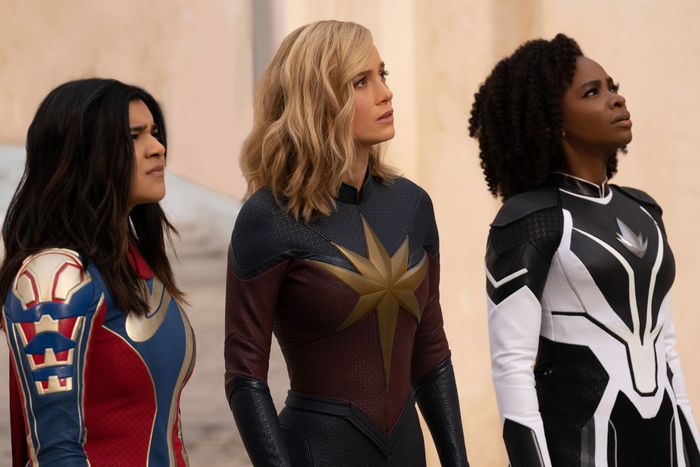
I’ve half-jokingly described the Marvel Cinematic Universe as the world’s slowest, most expensive television show — a serialized saga playing out at a pace of a few $200 million episodes a year. But The Marvels, the unfortunate latest installment in the never-ending superhero franchise, really does have the aura of a bulky episode of a half-abandoned series. The film is so rooted in Marvel’s TV output as to be confusing to anyone who hasn’t been dutifully keeping up with those shows, which has become more and more of a chore. You’d need to have watched WandaVision to know that Monica Rambeau, a child in Captain Marvel, has grown up into Teyonah Parris and acquired powers. Kamala Khan (Iman Vellani), Jersey City’s own superhero, has until now only existed within the bounds of the Ms. Marvel series. You can be current on all 32 previous movies and you’ll still find yourself studying the bursts of explanatory flashbacks for background on who these people are.
Still, that could be overcome — at this point, a key part of the MCU experience involves scrutinizing each character who pops up onscreen to figure out if they’re new or one you’re supposed to recognize. The problem with The Marvels is that it lacks so many of the elements it’s reasonable to expect from a movie, like momentum, stakes, and reasons to invest in its characters. Its conflict is just an excuse to get its three main superheroes in the same space, but it can’t come up with anything interesting for them to do once they’re there. It feels inarguably dinky in its scope, which is a real achievement for a movie reported to have cost somewhere around $275 million. The MCU was built on the promise of must-see events, but at this point is delivering what feels like a crossover episode created by dueling writers’ rooms who couldn’t agree on where or on whom to center their story.
The obvious suggestion would be Captain Marvel — Carol Danvers to her colleagues and estranged extended family, of which Monica is a member — the Brie Larson character whose 2019 outing was a Phase Three hit. But The Marvels, which was directed by Candyman’s Nia DaCosta from a script she wrote with Megan McDonnell and Elissa Karasik, isn’t sure how to handle Carol, who’s been spending her time patrolling space while occasionally checking in with Nick Fury (Samuel L. Jackson) and on other earthly concerns. She is, admittedly, a challenge — extremely powerful, isolated, and created so determinedly in the mold of the Strong Female Character that she’s ended up kind of a pill. But she also figures into the only genuinely promising theme that The Marvels has going for it. In the name of liberating the Kree, the expansionist alien race she once lived among, Carol destroyed their AI ruler. Instead of making things better, this act kicked off a decades-long civil war that left the Kree home world in ruins. Their new leader, Dar-Benn (Zawe Ashton), is The Marvels’ underwhelming big bad, someone trying to save the planet by stealing resources from other ones, with potentially genocidal results.
The idea of Captain Marvel as a failed interventionist who keeps making things worse with her forceful attempts to help is intriguing, and it’s too bad that the film pushes this material toward the back instead of making it the focus. Instead, The Marvels is halfheartedly about teamwork and vulnerability, with Kamala playing eager fangirl to Carol, whom she’s borderline erotically obsessed with, while Monica still feels resentment over being abandoned by the woman she thought of as an aunt. An encounter with a wormhole entangles the trio’s powers together, leading them to repeatedly switch places without intending to. And so the three women are awkwardly forced together to, as is tradition, save the universe, in this case from the consequences of Dar-Benn’s actions. This yields a few fun sequences along the way, like some dizzying location-hopping fight scenes, a musical number that’s better in theory than practice, and a development involving cat-shaped extraterrestrial Goose and a needle drop too good to spoil. The mission’s lack of coherence and urgency would feel less dire if the interactions between the characters felt in any way meaningful. But these characters remain so underdeveloped onscreen, with the movie counting on extratextual material to fill in their backstories and make you care, and I just couldn’t. Even the mid-credits scene, which teases a long-awaited development, has an air of sweaty desperation. The MCU keeps expanding, but it’s never felt so small.
More Movie Reviews
- The Accountant 2 Can Not Be Taken Seriously
- Another Simple Favor Is So Fun, Until It Gets So Dumb
- Errol Morris Has Been Sucked Into the Gaping Maw of True Crime


